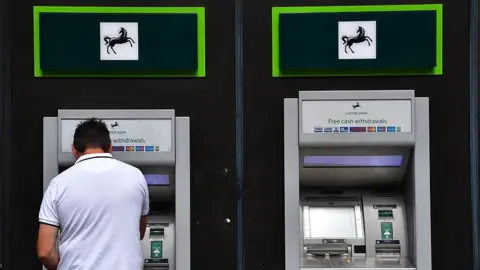Lloyds Banking Group to close 49 branches
 Getty Images
Getty ImagesLloyds Banking Group has announced that 49 branches will be closed.
Those closures, along with reorganisation elsewhere at the bank, will affect 1,230 jobs.
Lloyds says it is creating 925 jobs and existing staff will be redeployed "wherever possible".
Of the 49 banks earmarked for closure eight belong to the Halifax network and the other 41 are Lloyds branches. After those cuts the group will have 1,750 branches in total.
You can find a list of the banks due to close here.
Like other banks Lloyds has been reducing the size of its network as customers have switched to online and telephone banking.
When chief executive Antonio Horta Osorio took over in 2011 Lloyds Banking Group had almost 2,900 outlets, of which more than 600 were were spun-off in 2013 under the TSB brand name.
In October 2014 Lloyds announced 400 branch closures as part of a three year plan and last November another 49 were scheduled to be shut.
Lloyds says the banks affected in the latest round of closures all have a Post Office "within short walking distance", where banking services will be available.
Even after the latest closures, Lloyds says it will still have the biggest branch network.
"The changes in roles are in line with our plan to adapt to and meet the changing needs of our customers," the bank said in a statement.
"Today's announcement involves making difficult decisions, and we are committed to working through these changes in a careful and sensitive way," it added.
However, Federation of Small Business national chairman Mike Cherry said the bank's decision to accelerate its bank branch closure programme would "come as a real blow" to small businesses in the local communities affected.
"Equally, bank branches are vital to encouraging high street footfall. Cash is still the preferred payment method for thousands of shoppers.
"Reduced access to free to use cash machines is bad for our already embattled high streets and bad for local growth," he added.
In February Lloyds announced annual profits of £5.3bn, up 24% on the previous year and its strongest performance since 2006.